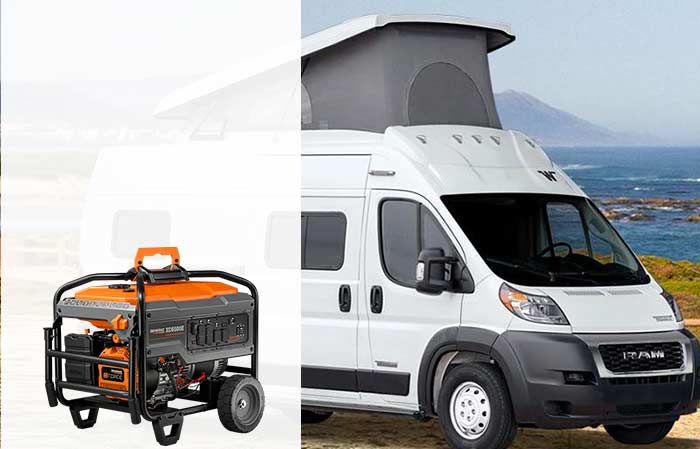Camping out in your RV is one of the most enjoyable outdoor activities you can engage in. Not only do you escape from the busy uptown life but getting close to nature is one of the most therapeutic activities to consider.
Even while you hide out in nature, you’ll still need some power for the electronics in the RV. You’ll still need GPS, an air conditioner and many other electronics. A generator will be the best option for this type of camping as it’ll provide the power needed for your electronics.
While some RVs come with inbuilt generators, others require a separate generator for power supply. Finding the right generator for your RV requires knowing exactly what your power requirements are, the amount of space you have for the generator and a few other factors.
This guide provides tips on the size of the generator to get for your RV and how best to make use of it.
The Right Size
The size of the generator for your RV depends largely on the amount of power you need. While some will need a few lights and light electronics such as a laptop and mobile phone, others may need to run air conditioners or even microwave ovens. The two users will definitely need different levels of power.
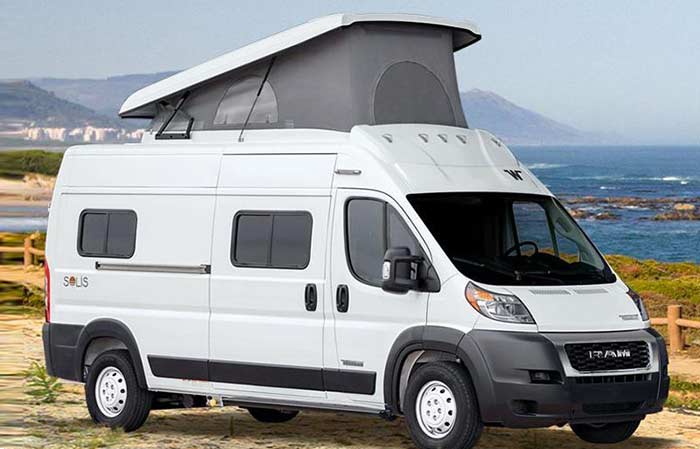
The average RV user with a few electronics will need about 2000 watts of power from their generator. That accounts for lights and a few light electronics. The medium to high power user with a microwave oven or air conditioner or even a little fridge will need at least 3000 watts of power.
To establish exactly how much power you need, look at the wattage ratings on each of your electronics then add them to get the total wattage needed. Look especially for the starting wattage for larger items such as fridges as they are usually more than the running wattage. After that, get a generator that produces at least 10% more power than the required amount to be on the safe side.
Factors that will determine the size
The factors that determine the size of generator you’ll need for your RV include the following:
Your power needs
The most important thing to consider when going for a generator for your RV is the amount of power you need. As stated above, it all depends on the type and size of equipment you need to run on power from the generator. If you’re a casual user with a few electronics, 2000 watts will serve you. Get more as per your needs.
Some common RV items and their approximate starting and running wattage are as follows:
| Appliance | Estimated Starting Wattage | Running Wattage |
| Air conditioner (13,500 btu) | 2800 to 3000W | 1500 to 2000W |
| Air conditioner (15,000 btu) | 3300 to 3500W | 1300 to 1800W |
| RV fridge | 6000W | 180W |
| Slow cooker | 170 to 270W | 170 to 270W |
| Electric grill | 1700W | 1700W |
| Small tube TV | 300W | 300W |
| Satellite receiver | 250W | 250W |
| Laptop computer | 250W | 250W |
| Radiant heater | 1300W | 1300W |
| Lights | Depends on bulb wattage | Depends on bulb wattage |
| Coffee maker (4 cups) | 600W | 600W |
| Microwave (650W) | 1000W | 1000W |
| Small flat TV | 120 to 200W | 120 to 200W |
| DVD player | 350W | 350W |
| Radio | 50 to 200W | 50 to 200W |
| Hair dryer (1600W) | 1900W | 1800W |
| Fan (portable) | 120W | 40W |
The sum of the wattages for your appliances gives you an estimate of the power you’ll be needing from your generator.
The type of generator
The main types of generators are those that run on gasoline, propane or diesel. In most cases, diesel generators are larger and more powerful compared to the ones running on gasoline and propane. It also depends on the amount of power you need.
The other choice to make is the type of fuel that’s affordable to you. Gasoline is usually costlier to diesel and propane and thus the latter are better options. Luckily, there are generators that run on both gasoline and propane. These give you options for when one fuel is available or cheaper than the other in a given area or season.
The physical size and weight of the generator
Your RV isn’t likely full of open spaces like a typical home is. As such, you need to get a generator that doesn’t occupy too much space in the camper. Typically, a larger generator produces more power than a smaller one. This, however, is quickly changing as generators get smaller and more powerful with time. The chances of finding a generator that’s small enough for your RV yet produces more power then you need are quite high these days.
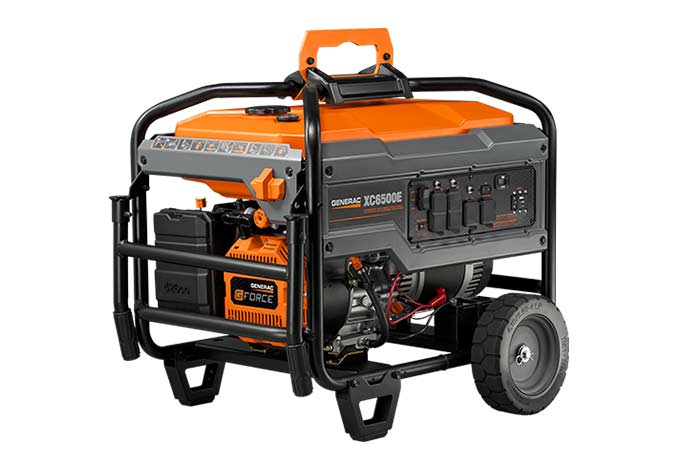
It is wise getting a generator with modular compatibility that is small and can be connected to another one to produce more power. A generator that produces 2000W weighs on average about 50 lbs. and is quite small. Getting two of them to produce about 4000W is far more manageable than getting a large one that produces 4000W and weighs about 100 lbs.
The amount of noise the generator produces
Unlike in a home setup where you can set up the generator away from the main house, the RV setup doesn’t have that level of luxury. You’ll need the generator close by, when sleeping or even around other campers. You therefore need to get a generator that’s as quiet as possible for this purpose.
In this department, you won’t need to worry much since there are very quiet generators that will make your life much easier when camping. In our expert opinion, anything less than 60 decibels of noise from the generator is low enough to warrant using with your RV.
By comparison, normal speech or an air conditioner has a sound level of 60 decibels. A vacuum cleaner produces 70 dBA and a hair dryer 80 dBA. Keep in mind that every time the noise level increases by 10 dBA the sound produced is twice as loud. As such, a hair dryer is twice as loud as a vacuum cleaner.
Fuel efficiency
Fuel efficiency is another very important factor to consider when getting a generator for your RV. You don’t want a gas guzzler that requires frequent trips to the local filling station. For this reason, always check for the runtime of the generator per full tank and the size of the tank in question.
The good news is that you likely won’t need to crank up your generator if you found the right size. Most generators will only need to run at about 50% of the total output for most RVs. At such a level, it’ll use little amounts of fuel and get less noise from the generator.
Runtime
The runtime of a generator refers to the amount of time the generator can be running without the need to shut it off. This is important for when you need power for a prolonged period of time such as when you need lights for the whole night.
Inverter or conventional generator
Generators either come with our without an inverter. The advantage of having an inverter is that it stabilizes the power output making is stable and safe enough for sensitive electronics such as TVs and mobile phones. The conventional generators are prone to power surges and are much noisier compared to the inverter type. Our advice is to go for the inverter generators.
Modular compatibility
Modular compatibility refers to the ability to connect two or more generators on a parallel connection that provides more power than a single generator on its own. This has the advantage of allowing you to buy small and affordable generators depending on your power needs.
This is not only cost-saving in terms of buying the generators but also saves money in that the generators will power themselves on depending on the power needs. If you’re using power that only one generator can produce, the others will shut down to save on fuel costs.
These aspects will guide you to make the right choice when it comes to picking a generator for your RV. They go beyond the size to include other important aspects which will save you the pain of making poor choices.
Best Generators Models & Brands for Your RV
Putting into perspective the factors above, some of the best generators for your RV include the following:
1. Yamaha EF2000iSv2
Easily one of the best RV generators, the Yamaha EF2000iSv2 packs some of the best features you expect from a generator meant to move around with you. It provides a starting wattage of 2000 watts and 1600 running watts. It’s very fuel-efficient as it runs on 1.1 gallons of gas (full tank) for 10.5 hours at a 25% of load. It also weighs just 56 lbs. and takes up very little space.
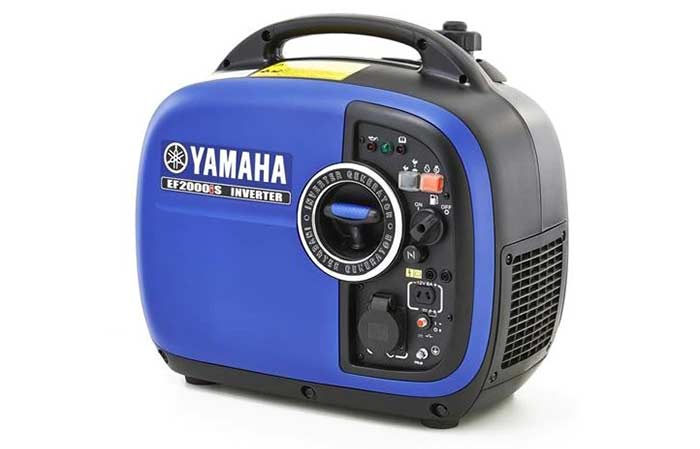
2. Honda EU2200i
One of the quietest options is this one from Honda and has a starting wattage of 2200 and a running wattage of 1800 watts. At just 48 decibels of noise when running at 25% load, it’s as quiet as a generator can be. It’s even quieter than an idling car. With a tank of 0.95 gallons of gas, you’ll get about 8.1 hours of runtime when at 25% load.
3. WEN 56203i
The WEN 56203i has a starting wattage of 2000 watts and running wattage of 1700 watts and a gas tank with a gallon capacity. It weighs just 40.3 lbs. and is the inverter type of generator that will provide the most stable power for your electronics. It’s also one of the quietest generators for your RV.
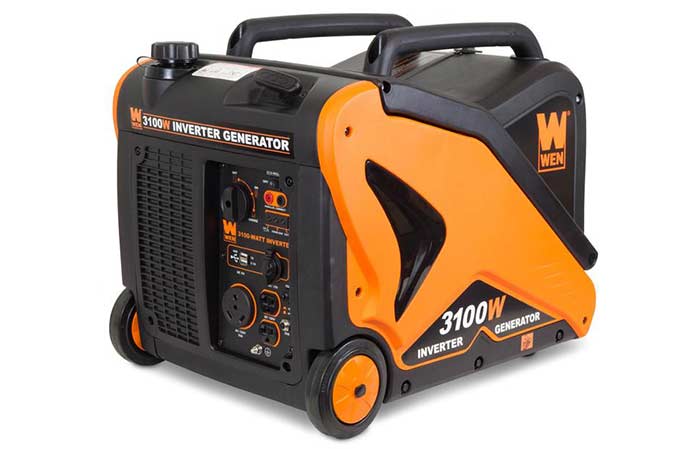
4. Generac GP3000i
One of the best generators for your RV, the Generac GP3000i weighs in at 59.5 lbs. and delivers a starting wattage of 3000 watts and 2300 running watts. It’s gas-powered with a tank that’s 1.06 gallons. This tank will provide 5.8 hour of runtime at 25% load.
5. Honda EU3000IH1A Handi
The Honda Handi has starting and running wattages of 3000 and 2600 watts respectively. It’s a high-end type with a weight of 78 lbs. and operating noise between 57 and 68 decibels as per the load on the generator. Being powered by gasoline, it has a tank with a 1.6-gallon capacity which provides a runtime of 7.7 hours when at 25% load.
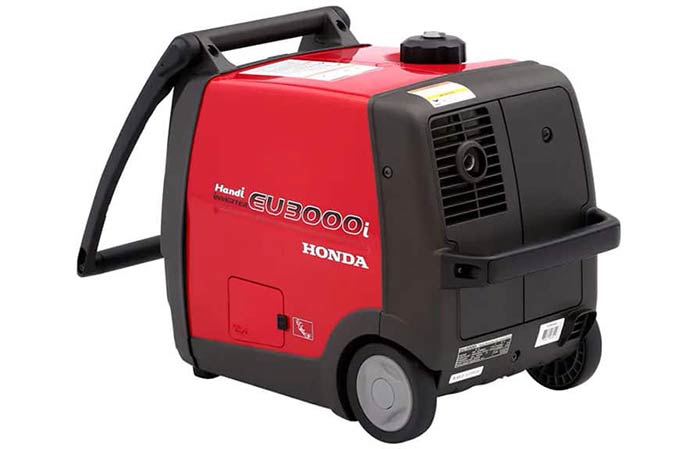
6. Predator 3500
This product from Harbor Freight has a starting wattage of 3500 and a running wattage of 3000 making it one of the most powerful yet very affordable. It also has a large tank with a capacity of 2.6 gallons which offer a runtime of 11 hours at 25% load. It’s a bit heavy compared to others in this category but still very light for the power it produces. It only produces 57 decibels of noise which is very low for a generator of its size.
7. Honda EU3000iS
The larger sibling to the Honda EU2200i, the EU3000iS produces a starting wattage of 3000W and a running wattage of 2800W. It has both an electric start and recoil starter. With noise levels of between 49 and 58 decibels depending on the load, it’s one of the quietest. It’s a bit on the heavy side as it produces 134 lbs.
8. Yamaha EF3000iSEB
Producing a starting wattage of 3000W with a boost of 500W for 10 seconds and a running wattage of 2800 watts, this Yamaha model is one of the most powerful since it has a total starting wattage of 3500W. It’s also quite silent with noise levels ranging between 53 and 60 decibels as per the load. It weighs 150 lbs. which can be a bit heavy for small RVs.
9. Yamaha EF4500iSE
This one is one of the larger options with a starting wattage of 4500W and a running wattage of 4000W. You can just about run anything in your RV with this one then connect it to the home when you return from your adventure. For a generator weighing 194 lbs., producing between 58 and 60 decibels of sound is quite impressive.
10. Yamaha EF6300iSDE
Another one of the powerful generators for your RV, this Yamaha model packs a serious punch with production of 6300 starting watts and 5500 running watts. That’s enough power to run almost all your RV electronics at once. While weighing in at 200 lbs., it’s a reasonable size and produces a quiet 58 to 64 decibels of noise.
Further Reading
